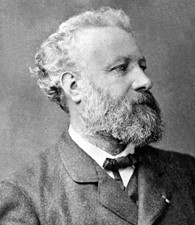Jules Verne was a pioneer in literature. With a powerful interest in writing and an imagination that was ahead of his time, Verne became a dominant figure in science fiction, writing about ideas that often didn’t become a reality until many years later.
Jules Verne’s Early Days
Jules Verne was born in Nantes, France, on February 8, 1828. With his parents, Pierre and Sophie, he and his four siblings led a quiet life. Jules attended Saint-Stanislas school and the Royal school in Nantes. He earned a high school diploma in literature in 1846, and a law diploma in 1848.
During his childhood, young Jules would watch ships come and go from a local port. He used these experiences years later to create his “Voyages Extraordinaires” or “Extraordinary Journeys.”
Pierre wanted his son to become an attorney, so he sent Jules to Paris to continue his law studies. However, literature was Jules’ primary interest. He wrote stories and news, and was secretary of the Théâtre Lyrique until 1854.
In 1856, Verne met a widow named Honorine Morel; the two married in 1857. They had one child together, and Honorine had two daughters from her first marriage. Verne became a stockbroker for several years to support his family. Throughout this time, he continued writing and researching at France’s National Library, and imagined ideas for a book that combined fiction and actual science.
Sources in this Story
- Encyclopedia Britannica: Jules Verne
- Smithsonian Institution Libraries: A Jules Verne Centennial: 1905-2005
- BBC News: How Scotland inspired Jules Verne
- NASA: The Jules Verne
Verne’s Notable Accomplishments
Verne is often called “the father of science fiction,” but the Smithsonian Institution Libraries says he was actually more of a “writer of ‘science fiction.’” He was the first author to see that scientific discoveries in the 19th century were an ideal starting point for adventure novels. Verne wrote ahead of his time, dreaming up concepts—like underwater travel in the Arctic Ocean and balloon voyages around the world—that would have to wait decades before someone made them a reality.
The challenges posed by losing his father’s financial support weren’t permanent. Verne wrote many books, but two of his most famous are “Twenty Thousand Leagues Under the Sea” and “Around the World in Eighty Days.” The popularity of these books and others ultimately made him “a very rich man.” In 1876, Verne bought a yacht and sailed around Europe. His last novel, “The Invasion of the Sea,” was released in 1905.
The Man and His Work
- “20,000 Leagues Under the Sea”
- “Around the World in 80 Days”
- “Journey to the Center of the Earth”
- “Invasion of the Sea”
- “From Earth To The Moon”
The Rest of the Story
Even though he was French, Verne found inspiration for his writing from a variety of places, primarily Scotland. After a trip from Loch Lomond and the Trossachs, he generated ideas for the book “The Underground City.” Verne had never seen mountains as a child and the unique terrain of the area made a great impression on him. He climbed Arthur’s Seat in Edinburgh and skinny-dipped at Portobello. Verne scholar Professor Ian Thompson told the BBC that Verne took artistic liberties with his writing because he never let some facts “get in the way of good fiction.”
On March 24, 1905, Verne died, leaving behind a vast collection of finished works, and “a drawerful of nearly completed manuscripts in his desk.” In the 20th century, his writings were translated into more than 140 languages. The world has continued to appreciate what he created, with naval submarines and an Automated Transfer Vehicle (ATV) bearing his name.
This article was originally written by Lindsey Chapman; it was updated on December 9, 2016.











